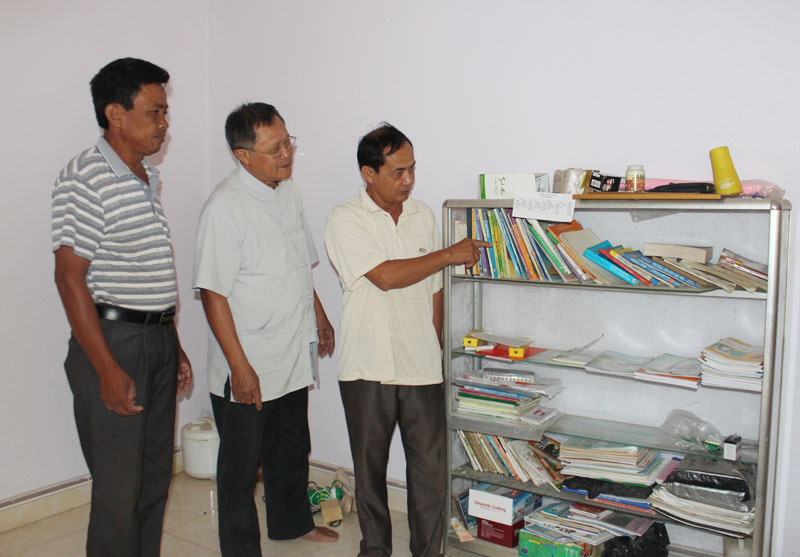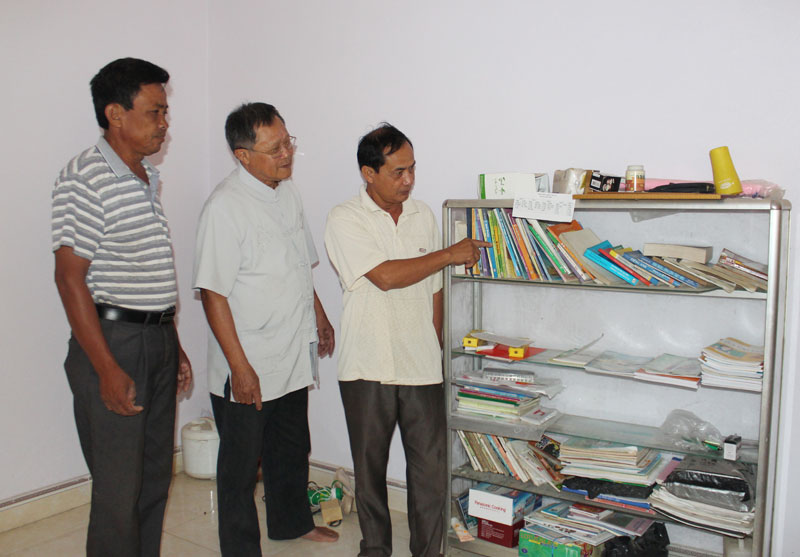
(HBO) – More than 90 percent of households which account for over 90 percent of population in Hoang Dong hamlet (Khoan Du commune, Lac Thuy district, northern mountainous Hoa Binh province) are Catholics. Upholding the tradition of "Hoang Dong Party Group”, the hamlet leads the whole commune in the "Study and talent encouragement” emulation movement over the past years.
The hamlet
is now home to 157 households, 140 of them are Catholics. In 2017, the average
income of the hamlet reached 47 million VND per person, which is expected to
hit 48 million VND this year. The improved lives have prompted local residents
pay more attention to study encouragement. Specifically, all families put money
in "piggy banks” and follow the campaign "Drum for study encouragement” which
are maintained regularly and effectively. Their children in school age could
learn in quiet study corners with adequate lighting and suitable tables and
desks. Several households built family bookcases to foster their children’s
reading habit.

Photo: Staff
of Khoan Du commune’s study encouragement association inspects "Family
bookcase” model in Hoang Dong hamlet.
The
launch of the study encouragement fund has been welcomed by local residents. Each
year, the hamlet urges each household to contribute 30,000 VND to the fund. Therefore,
the fund could raise over 5 million VND each year. The hamlet withdraws part of
the fund to present gifts to students with outstanding academic performances
during each Mid-Autumn festival.
In
particular, the hamlet also sponsors poor students achieving excellent study
results. The Party Cell of Hoang Dong hamlet now sponsors three poor students
while the war veterans’ association also actively supports the study
encouragement fund.
Thanks to
regular support from the Party Committee and authorities to study encouragement
over the past years, Hoang Dong hamlet has recorded no dropouts and increasing
number of students with fair and outstanding academic performances. In 2017,
three local students were admitted to universities and colleges. This year’s
number was four. More than 82 percent of local households meet "cultural
family” standards this year./.
The emulation movement "Hoa Binh joining hands to build new-style rural areas” has been widely spreading, becoming a driving force that motivates the localities to renew rural landscapes and improve the material and spiritual lives of the residents. In this movement, the people play a central role-both as the main implementers and direct beneficiaries of its outcomes.
In response to the global digital revolution, Hoa Binh Newspaper is transforming itself into a modern and multi-platform media hub, blending cutting-edge technology with a restructured newsroom and a new generation of tech-savvy journalists.
Hoa Binh province’s Association of the Elderly recently held a conference to review the project on expanding the inter-generation self-help club model until 2025.
In a move to implement Resolution No. 57-NQ/TW, issued on December 22, 2024 by the Politburo, which targets breakthroughs in science-technology development, innovation, and digital transformation, the Hoa Binh provincial Department of Health has issued a plan to roll out the "Digital Literacy for All” campaign within the local health sector.
An Nghia Commune (Lạc Sơn District) is one of the communes that achieved the tha standard of the national new rural area in 2018. Entering a new development phase, the commune is now trying to meet the criteria for the advanced new rural development. With the strong political will and the public consensus, the commune is gradually overcoming the challenges to reach this goal, aiming for the sustainable development.



